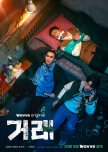This review may contain spoilers
Why Jae-Hyo is the Perfect Villian and How Poverty can make Individuals into villians
I enjoyed this drama more than I expected, what made this show so entertaining was how serious the tone was and how desperate the main characters were. I liked the pacing of the plot: where we go from 'let's just pretend to kidnap' to 'let's kill our friend' to 'I'm going to be the only one left alive'.
I read a lot of criticism about Song Jae-Hyo's character and that his backstory wasn't powerful enough to make him the villain that he was, however, I completely disagree with that take and think the writers did a fantastic job with both Jae-Hyo and Jun-Song. I'll explain why. Typically, the audience would think that Jun-Song, with debt collectors after him and his family, would turn to crime, however, it's actually Jae-Hyo, whose motivations come from being expelled from his medical school, that does.
Jae-Hyo is the perfect archetype, a villain who thinks that the whole world is against him and that he has 'no other choice' when in reality he's put himself into his own situation and cannot deal with accepting his wrongdoings. The difference between Jae-Hyo and Jun-Seong is that one shows remorse for their misdeeds while the other does not. Jaehyo's lack of drive is exactly what makes him the perfect villain, we as the audience can understand that he actually does have other choices but he himself cannot see beyond the 'injustice' of his life. It was his fault, for creating a cheating ring, that he got expelled. It was indeed unfair that only he got caught, but again he did the scheme himself. His life WAS NOT over because of his expulsion, but he was so blinded by his own 'values' and his own definition of 'ethics' that he made everything ethical in his eyes, repeating over and over again that 'he has no other choice'.
What makes Jaehyo become my favourite villain, from a drama, is the final episode where he evens sells out his friend, paying off the debt collectors to kill him, all because his friend suggested they had to leave the country. It's ridiculous, from the audience's perspective, but of course, to Jaehyo it's extremely plausible. He sees no wrong in what he does because he, for his actions to make sense, has to accept that he has no other choice-when indeed he does. He's such a deeply crafted character and people saying he's poorly written are really missing the depth of his character.
Then we see Jun-sung, the character who I had sympathy for, all along he is pressured to go through with this plan, and while yes he is also an accomplice, the way he's written really shows how desperate a human being can be. What else is he to do, except turn to crime? Owning half a million to debt collectors and having his organs donated if he didn't pay, his father even tried to pay off his son's debt by secretly donating his organs, but it didn't stop them. He truly, I feel, has no other choice. Jun Seong is someone who truly was a victim of a lack of resources in society. He even admits that it was his fault, for gambling, but that there is no way to go back in time and correct his wrongs. He made a mistake and doesn't deserve to lose his life for it.
The juxtaposition of Junseong, who has remorse but no other choice, and Jae-hyo, who has no remorse and another choice, pairs perfectly with the plot. My theory is that, no matter what position Jae-hyo was in, he would always turn to crime and would always victimize himself believing that he had no other choice. Had he become a doctor he would have found a way to make more money, illegally, to cheat. He never would've been happy. Whereas Junseong, had he not gambled, would've been a positive influence in society and would've lived an ethical life.
The drama isn't at all trying to glorify crime or to say that crime is acceptable when one is desperate, but it gives an insight into the reality of poverty and how, for some, this may be something they think about because they have no other means of living.
I read a lot of criticism about Song Jae-Hyo's character and that his backstory wasn't powerful enough to make him the villain that he was, however, I completely disagree with that take and think the writers did a fantastic job with both Jae-Hyo and Jun-Song. I'll explain why. Typically, the audience would think that Jun-Song, with debt collectors after him and his family, would turn to crime, however, it's actually Jae-Hyo, whose motivations come from being expelled from his medical school, that does.
Jae-Hyo is the perfect archetype, a villain who thinks that the whole world is against him and that he has 'no other choice' when in reality he's put himself into his own situation and cannot deal with accepting his wrongdoings. The difference between Jae-Hyo and Jun-Seong is that one shows remorse for their misdeeds while the other does not. Jaehyo's lack of drive is exactly what makes him the perfect villain, we as the audience can understand that he actually does have other choices but he himself cannot see beyond the 'injustice' of his life. It was his fault, for creating a cheating ring, that he got expelled. It was indeed unfair that only he got caught, but again he did the scheme himself. His life WAS NOT over because of his expulsion, but he was so blinded by his own 'values' and his own definition of 'ethics' that he made everything ethical in his eyes, repeating over and over again that 'he has no other choice'.
What makes Jaehyo become my favourite villain, from a drama, is the final episode where he evens sells out his friend, paying off the debt collectors to kill him, all because his friend suggested they had to leave the country. It's ridiculous, from the audience's perspective, but of course, to Jaehyo it's extremely plausible. He sees no wrong in what he does because he, for his actions to make sense, has to accept that he has no other choice-when indeed he does. He's such a deeply crafted character and people saying he's poorly written are really missing the depth of his character.
Then we see Jun-sung, the character who I had sympathy for, all along he is pressured to go through with this plan, and while yes he is also an accomplice, the way he's written really shows how desperate a human being can be. What else is he to do, except turn to crime? Owning half a million to debt collectors and having his organs donated if he didn't pay, his father even tried to pay off his son's debt by secretly donating his organs, but it didn't stop them. He truly, I feel, has no other choice. Jun Seong is someone who truly was a victim of a lack of resources in society. He even admits that it was his fault, for gambling, but that there is no way to go back in time and correct his wrongs. He made a mistake and doesn't deserve to lose his life for it.
The juxtaposition of Junseong, who has remorse but no other choice, and Jae-hyo, who has no remorse and another choice, pairs perfectly with the plot. My theory is that, no matter what position Jae-hyo was in, he would always turn to crime and would always victimize himself believing that he had no other choice. Had he become a doctor he would have found a way to make more money, illegally, to cheat. He never would've been happy. Whereas Junseong, had he not gambled, would've been a positive influence in society and would've lived an ethical life.
The drama isn't at all trying to glorify crime or to say that crime is acceptable when one is desperate, but it gives an insight into the reality of poverty and how, for some, this may be something they think about because they have no other means of living.
Was this review helpful to you?











